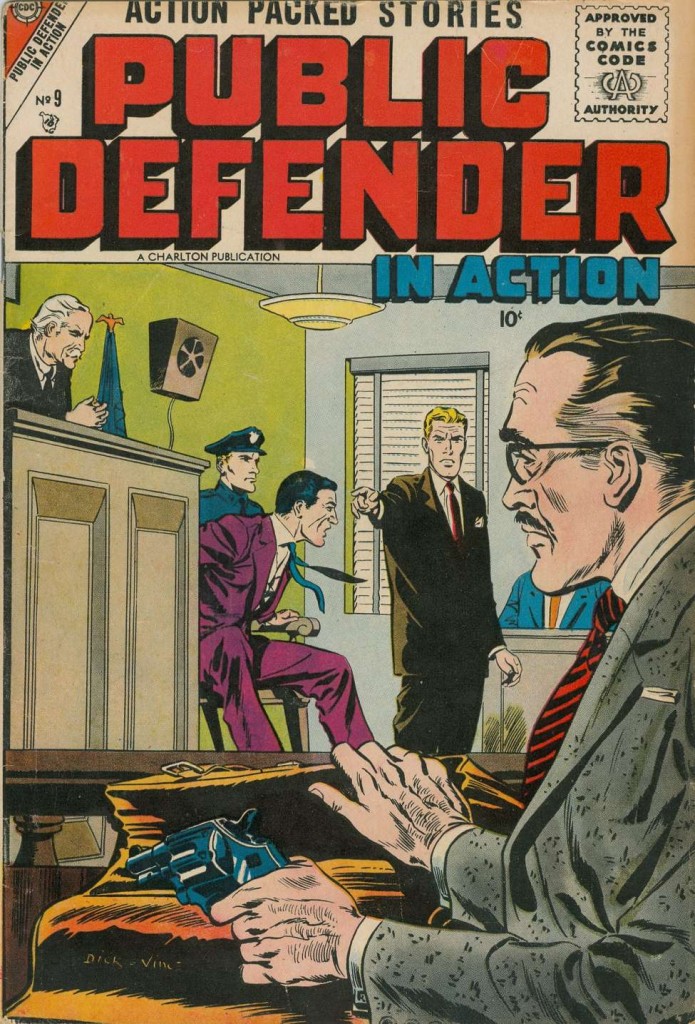Friday Links
After interviewing Tiger Lawyer creator Ryan Ferrier earlier this year, we couldn’t resist posting the cover of Tiger Lawyer #3, which you see above. Apparently, it features a story called “Tiger Lawyer Must Die,” so there could be trouble for our protagonist. In case you’ve missed it, we’ve previously mentioned Tiger Lawyer a number of times (including here, here, here,here, and here.)
In last week’s edition of Friday Links, we posted the cover of Public Defender in Action #9, which depicted a gentleman – with a gun! – sitting at counsel table in a courtroom while the title character cross examined a witness (presumably on behalf of the firearm-toting figure). In our post, we wondered who that mysterious gentleman might be and whether it was the defendant. Well, in response, a diligent reader – and the father of one of our writers – responded with these thoughts (which we have dutifully secured permission to post here):
It is customary in many criminal courtrooms for the prosecution table to be nearer the jury. Considering that for your comic book cover, the person with the gun would be at the defense table as the jury is behind the attorney examining the witness.
The comic probably grew out of the television show “The Public Defender“, Hallmark Entertainment and Hal Roach, which ran from March 1954 to June 1955, Actor Reed Hadley played attorney Bart Matthews as The Public Defender. There was a Studio One production of “The Defender” in 1957 which starred Ralph Bellamy, William Shatner, and Steve McQueen. The “Perry Mason” show began in 1957 and ran to 1966 with 271 episodes. For trivia purposes, Mason lost three times on the show:
1.”The Case of the Terrified Typist,” June 21, 1958, Episode 38. Jury returns a guilty verdict against Mason’s client. Later it turns out that the defendant is an imposter, but it was a guilty verdict at trial.
2. “The Case of the Witless Witness,” May 16, 1963, Episode 181. Mason loses an appeal.
3. “The Case of the Deadly Verdict,” October 17, 1963, Episode 185. Mason’s client is found guilty of murder and sentenced to death. Mason later finds someone else did the murder, but a guilty verdict was returned against him.
As you may recall, we occasionally write about beers with legal sounding names. Well, Stone has released a spicy pair of brews called Crime and Punishment. Apparently, it is so spicy that the brewery filmed people taking a sip to capture their reactions. Here’s a quote from the brewery’s YouTube page:
We have created what could arguably be described as some of the spiciest beer on the planet. Then we asked people to try it…just to see how they’d react. Hijinks ensued, dutifully recorded in slowwwww motion.
To watch the video in question, see here.
Speaking of beer, you may recall that not too long ago we interviewed Daniel Hartis, author of Charlotte Beer: A History of Brewing In The Queen City. If you missed it, you can read that interview here. Well, this week, The Charlotte Observer published Daniel’s thoughts on the opening of two new breweries, those being The Unknown Brewery and D-9 Brewing Company. You can read that article here.
Over at Above The Law, Tamara Tabo writes about the interesting intersection of public safety laws and freedom of religion. Check it out, as it’s not what you think.


















